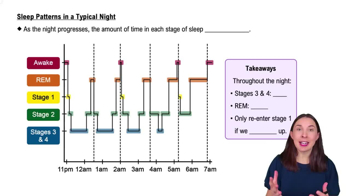Table of contents
- 1. Introduction to Psychology1h 43m
- 2. Psychology Research2h 20m
- 3. Biological Psychology2h 41m
- 4. Sensation and Perception28m
- 5. Consciousness and Sleep32m
- 6. Learning41m
- 7. Memory34m
- 8. Cognition37m
- 9. Emotion and Motivation35m
- 10. Developmental Psychology33m
- 11. Personality48m
- 12. Social Psychology41m
- 13. Stress and Health41m
- 14. Psychological Disorders44m
- 15. Treatment47m
5. Consciousness and Sleep
Sleep
Struggling with Psychology?
Join thousands of students who trust us to help them ace their exams!Watch the first videoMultiple Choice
One disadvantage of a longitudinal research design is
A
individuals of different ages are being compared to each another.
B
that it is extremely complicated.
C
the lengthy amount of time involved.
D
ethical concerns.
 Verified step by step guidance
Verified step by step guidance1
Understand the concept of a longitudinal research design: It involves studying the same group of individuals over an extended period to observe changes and developments.
Identify the common disadvantages of longitudinal studies: These can include time consumption, high costs, participant dropout, and potential changes in research focus over time.
Recognize that comparing individuals of different ages is not a disadvantage of longitudinal studies, but rather of cross-sectional studies.
Consider the complexity of managing a study over many years, which can involve logistical challenges and maintaining consistent methodology.
Acknowledge that the primary disadvantage of longitudinal research is the lengthy amount of time required to gather data and observe outcomes, which can delay results and conclusions.

 3:25m
3:25mWatch next
Master Circadian Rhythms with a bite sized video explanation from Hannah Gordils
Start learningRelated Videos
Related Practice


































































































![Race, Genes and IQ Differences | Bret Weinstein [Mini Clip]](https://img.youtube.com/vi/IztL_m3pd70/mqdefault.jpg)



































































































